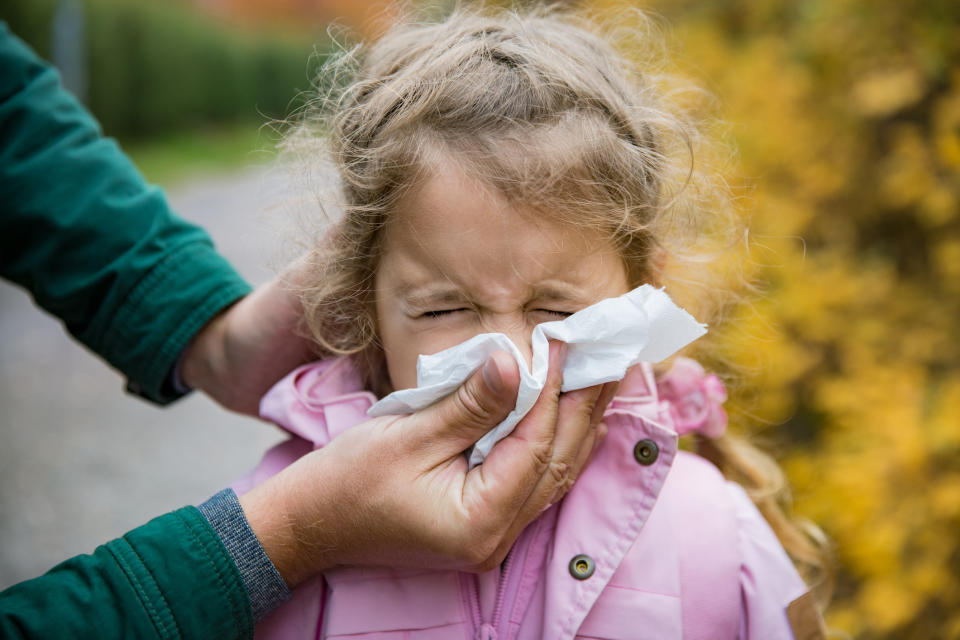When should I worry about my child’s cold and cough?
Most parents have sent their child to school with a sniffle or a cold before. But now several schools in Victoria and NSW have closed due to confirmed cases of COVID-19, is it ever ok to send your kids to mix with others if they’re even just a bit under the weather?
The official guidelines across the country are clear. “Anyone who is sick with flu-like symptoms, even with mild symptoms, should not attend school or childcare,” say NSW Health.

There have been just over 300 children in Australia who have tested positive for COVID-19, and less than 100 of those were under 10. But even though they are at low risk, they could still pass on the virus, giving it to vulnerable people in the community.
We asked a GP the best course of action if your child has a runny nose, cough, or cold symptoms – and if there are ever any exceptions to keeping them away from school or childcare. (Spoiler alert: no)
What does coronavirus look like in children?
Symptoms of COVID-19 include a fever, cough, sore or scratchy throat and shortness of breath. Other reported symptoms include a runny nose, diarrhoea, loss of smell and or taste, joint pain, loss of appetite, and nausea or vomiting. However, in children “it usually presents as a fever and cough,” says GP, Dr Lucy Rosman.
“Children are a lot less commonly infected than adults, accounting for approximately one to two per cent of clinical cases. However, children with underlying medical conditions such as asthma, cardiovascular disease or immunosuppression are at increased risk for more severe disease.”
My child has a runny nose. Can they go to school?
No. Even if they “just” have a runny nose and seem fine in themselves, “they still need to stay away from school.” says Dr Rosman. “The best thing to do is to get them tested for COVID-19 at either a COVID clinic or to present for review at the GP for further examination and possible COVID testing. This way if they continue to be unwell, we know that they are not at risk of transmitting COVID-19.”
My child is prone to coughs. Can they still go to school if they have their ‘normal’ cough?
No. “Children shouldn’t go to school with a cough until they have been cleared of COVID-19,” says Dr Rosman. “Parents should keep children home from school and seek guidance from their GP in this situation. We would usually advise clinical review at the practice and then possibly COVID testing. The COVID testing turnaround time is approximately 24 hours for a result and that way parents can be reassured that if their child is clinically well and has their ‘usual cough’, such as asthma, they can return to school knowing they do not have COVID-19.”
She adds: “GPs are also available via telehealth for advice which can be useful for busy families - although nothing is as good as examining a patient with a stethoscope!”

How can parents tell if their child just has the sniffles, or if it’s something more serious?
Parental instinct usually counts for a lot, but in the case of coronavirus, it’s still worth keeping them away from others if they’re sniffly, have a runny nose or a cough, says Dr Rosman. “Parents are usually the best judge of their children’s health, but in the case of COVID-19, the sniffles could the only sign your child has the virus,” says Dr Rosman.
“So, in this case, it is good to seek expert advice from your GP. Usually though, if your child has a runny nose but no fever, is eating and drinking normally and behaving in their usual way then it is unlikely that a runny nose is a sign of something more serious. Having said that, children can deteriorate quickly, especially babies and younger children, so if parents are concerned in any way they should seek medical attention.” The moral of the story? Even if your child is fine in themselves but has a runny nose, cough, or cold, you should still keep them away from school and other people until they are better.
In some rare cases, coronavirus has been linked to Kawasaki disease in children. What is this?
Kawasaki Disease affects around one in 10,000 children, so is very rare. “Kawasaki Disease is a rare paediatric vasculitis – in other words, it causes the blood vessels to become inflamed,” explains Dr Angus Stock from the Walter and Eliza Hall Institute, who specialises in researching immunotherapies for Kawasaki Disease.
“In serious cases, this can occur at the major blood vessels of the heart and can lead to children having heart attacks. The most common symptoms are prolonged fever that lasts more than a few days, rash, conjunctivitis, irritability, systemic inflammation/redness, swollen lymph nodes particularly of the head and neck, strawberry red tongue and cracked lips. In addition to these classical symptoms, children who are developing a Kawasaki-like Disease following SARS-Cov-2 infection also frequently exhibit low blood pressure and abdominal pains. If you’re concerned about any symptoms in your child, see a doctor.”
Click here to find your nearest COVID-testing centre in NSW, QLD, Victoria, SA, WA, NT, Tas, ACT
Sign up to our daily newsletter here to get all the latest news and hacks. Or get in touch at lifestyle.tips@verizonmedia.com.

 Yahoo Lifestyle
Yahoo Lifestyle 



